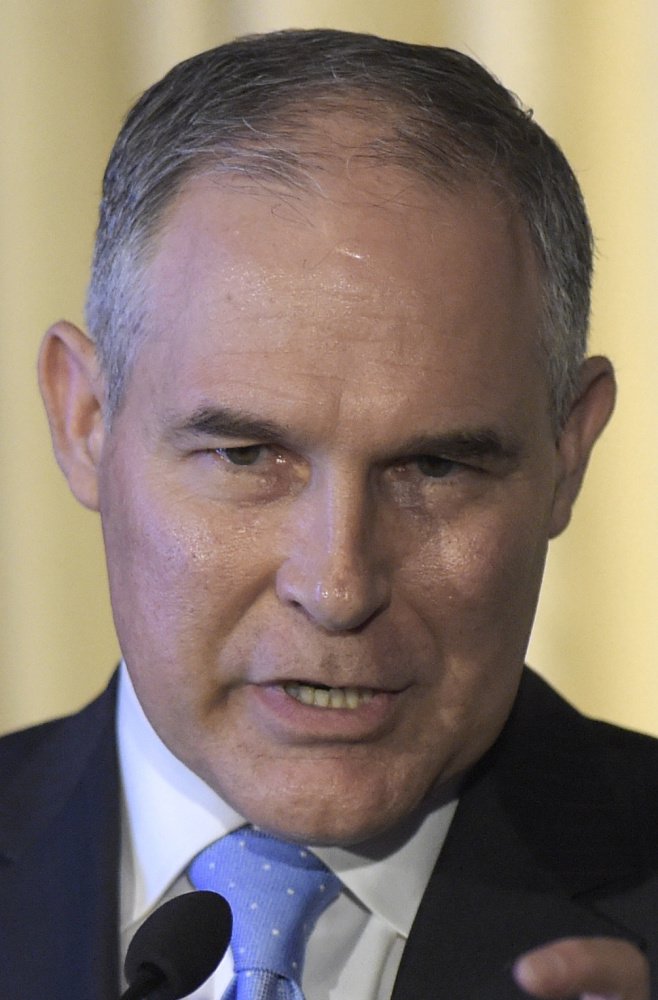One might be tempted to assume that having Scott Pruitt — a devout climate change denier who, as head of the U.S. Environmental Protection Agency, is to public health what medieval rats were to, well, public health — admit that humans have influenced the planet’s climate would be a good thing. Not so fast.
In an interview at the friendly venue of a Sinclair Broadcast-owned Las Vegas TV station, KSNV, the EPA administrator conceded that climate change is a reality and that human activities have contributed to it “to a certain degree.” But then he tossed in a monkey wrench. He suggested that a warming climate is not “necessarily” a “bad thing.”
“Do we really know what the ideal surface temperature should be in the year 2100? In the year 2018?” the former Oklahoma attorney general said. “I mean it’s fairly arrogant for us to think that we know exactly what it should be in 2100.”
Pruitt isn’t the first climate skeptic to try that particular dodge, but he’s surely the most high-ranking in the government of any industrialized nation and perhaps the one most surrounded by scientists who know better but who apparently can’t penetrate his administrative bubble. Usually to find this level of ignorance you have to go to Congress where members might parade a snowball on the House floor to demonstrate that it’s still cold in winter.
Let’s revisit Earth and remind ourselves what a consensus of actual experts is telling us: Climate change is real. Greenhouse gases (principally carbon dioxide) produced by humans burning fossil fuels are making it much worse. Problems related to rising temperatures — melting ice, rising sea levels, harm to ecosystems, worsening weather events, droughts and floods — are already manifest but are expected to grow much worse in the century ahead.
And, here’s the odd thing, Pruitt is correct in one narrow respect. As some regions on the planet are harmed by the loss of fresh water supplies or viable farmland, for example, others might well be helped. Regions that were too cold to grow certain crops might now be able to support them because the growing season will be longer or warmer. Deserts might get rain. North Avenue may become the new Inner Harbor. If one ignores the huge cost in lives lost, property ruined, economies collapsed, diseases spread and political upheaval and on and on, then, yes, there might be an upside to certain individuals in certain locations.
The EPA administrator isn’t interested in getting a “balanced” view of climate change, he’s grasping at whatever is available to justify rolling back regulations, which he has done with abandon since President Donald Trump took office. Surely, no one in the Trump cabinet has taken the mantra more seriously or made himself more of a tool of the petroleum industry, although Interior Secretary Ryan Zinke and his willingness to open up the nation’s coastal areas to oil and gas exploration is giving him a run for the money.
The U.S. has already lost considerable credibility on the world stage with the Trump administration’s decision to withdraw from the Paris climate accords. How much more scientific data are we willing to ignore? Across the country, there are states, cities and towns that have tried to contain the breach. In Maryland, for example, Republican Gov. Larry Hogan has taken a far more rational approach in seeking to curb greenhouse gas emissions and support renewable energy. Last month, he decided to join the U.S. Climate Alliance, and he has supported Maryland’s efforts to set emissions goals beyond those touted by the Paris agreement.
For all the noise that’s been made by the Trump administration over ephemera like parades or insults, tweets or other incivilities, the lasting damage wrought by Pruitt deserves far more attention than it currently draws. By last count, the EPA has rolled back (or is in the process of rolling back) 67 environmental safeguards from lifting the ban on an insecticide associated with brain damage in children to eliminating wetland protections. The damage he’s doing will be significant and lasting. Local communities are in no position to clean up after such a colossal mess — except perhaps in northern Canada, Greenland or Siberia where Pruitt might yet find his post-climate change paradise.
Editorial by The Baltimore Sun
Send questions/comments to the editors.



Success. Please wait for the page to reload. If the page does not reload within 5 seconds, please refresh the page.
Enter your email and password to access comments.
Hi, to comment on stories you must . This profile is in addition to your subscription and website login.
Already have a commenting profile? .
Invalid username/password.
Please check your email to confirm and complete your registration.
Only subscribers are eligible to post comments. Please subscribe or login first for digital access. Here’s why.
Use the form below to reset your password. When you've submitted your account email, we will send an email with a reset code.